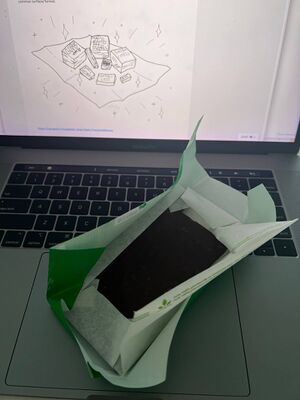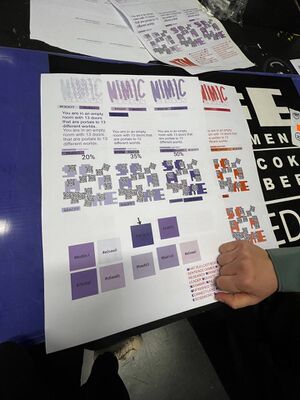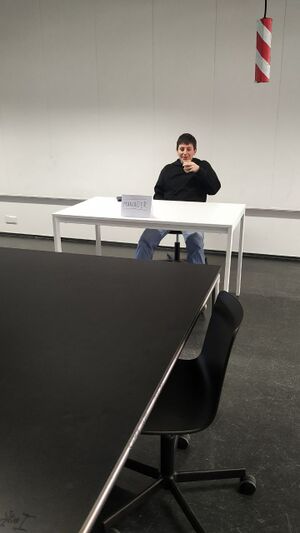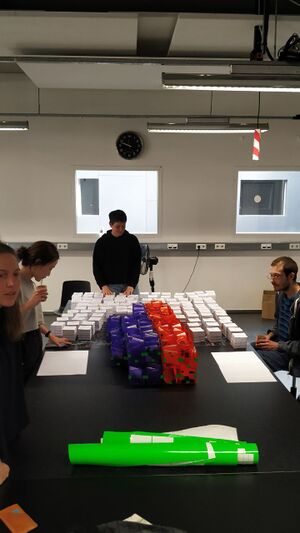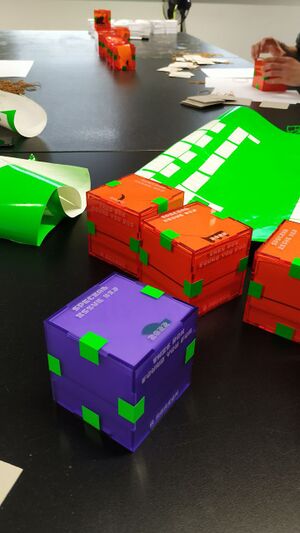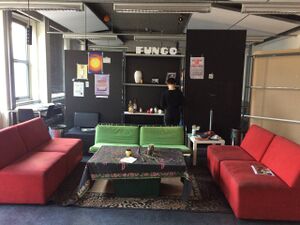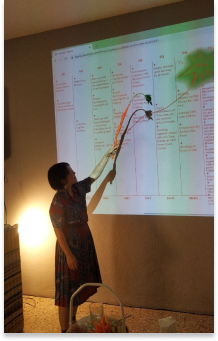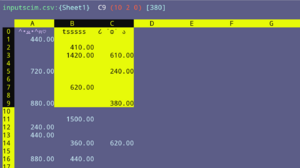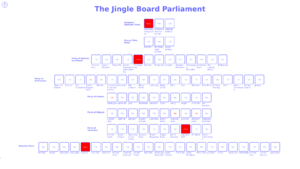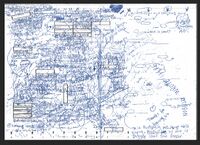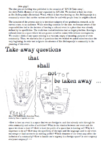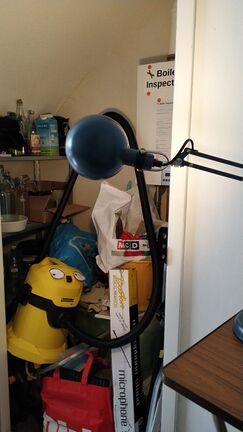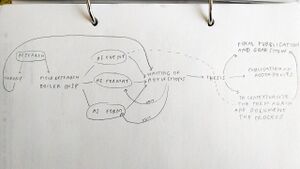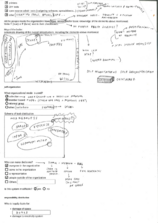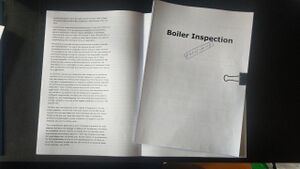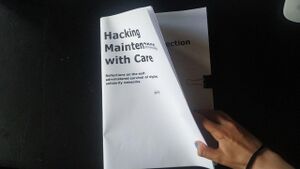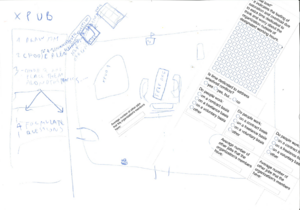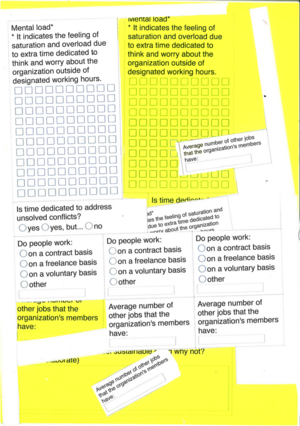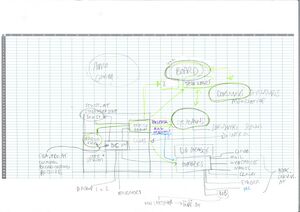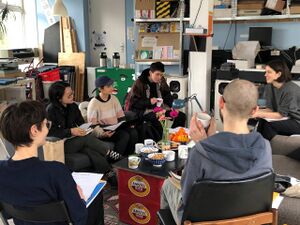User:Erica/Final presentation
(❍ᴥ❍ʋ)
HACKING MAINTENANCE WITH CARE
behind the scenes of these 2 years
PREVIOUS PRACTICE
Special Issues and development of Research Writing Methods and Prototyping practice
SI#16: Learning how to walk while catwalking
- API as publishing surface
- reflecting on the politics of web services and how these can be reappropriated
- how to use a technology collectively and how to do it in our own terms
- how to show the backend in the frontend.
- main challenge: building awareness about how different types of knowledge can create hierarchies in collaborative projects, and how to balance this and how to legitimize different approaches and knowledges
- And I wish that your question has been answered, with Carmen, Miriam and Mitsa
- How a simple python function like replace() can be used without mastering coding skills and still result in a meaningful gesture --> intervention on formal political speech
SI#17: This box found you for a reason
- designing a playful format that could host everybody's contribution and at the same time create a link between them: the post-it lootbox (we printed 85000 post-its)
- contact with the vendors and field trips to printing facilities + admin side of production. It was important to experience the unpredictability of the production process and the kind of negotiation happening between the vendors, the resources available and the desires of the design team.
- in parallel: experimenting and sharpening decision making processes within the group
SI#18: Radio Implicancies. Methods to practice interdependencies
- weekly release, faster pace, letting things go without overthinking, experimenting different roles and approaches:
- highlight: caretaking:
- proposing structures and platforms to facilitate and host my classmate's contributions, and trying to challenge the divisions of roles as well.
- developing of a facilitation practice in between caretaking and infrastructuring to support other ways of researching with others
more info and more in-depth reflections here
Hackpackts and side practice
Through the Special Issues I enjoyed the development and exploration of a heterogeneous practice, with some recurring patterns that became even more evident in the second year.
Reading and writing habits developed in strict parallel with annotation, small coding experiment, and the playfulness of different formats.
From the collective annotation in the pad to the intervention in the text with the replace function (reworking of Glissant's Forced Poetics) (which then become fundamental to the first special issue contribution) to the scripting of workshops, to more informal collective moments were spontaneous reading groups have formed (f.e. the Breakfast Club)
Prototyping: from playful creation of tools to use together and to code together (the soup generator, karaoke republishing, etc.) to a sharper construction of a critical and situated making of tools, and use of technology as well, with the twofold intention of both generating reflection and bringing to the front hidden aspects (from the infrastructure to the invisible labor)
Methods and approaches that became fundamental to the thesis and the graduation project:
- decontextualizing reappropriating and re-enacting the aesthetics of (academia) language, in order to play with the boundaries of formal, informal, behind the scenes, public and private, leisure time and working time in collaborative projects. (from SI#18.02 Uneven Patterns, to Critical and intimate evaluation of crunchiness, Residency in Cagliari [IT] wiht Chae)
- smuggling techniques from one domain to another and experimenting with hybrid formats and aesthetics. Interest in creating playful interfaces that intervene in the meaning of content through their function, aesthetics(from SI#18.04 Jingle Board Parliament to a Spreadsheet sequencer to the Boiler Inspection ...)
- facilitating collective research through scripted soft-performed workshops (from the SI#18.06 Sharing methods for diffractive reading to Small, Clumsy, and Intimate Devices for Awkward Hybrid Settings @ INC, Amsterdam with Chae)
- expanded on the idea of facilitating, curating and hosting collectively public events, and experimented with different formats as well: how to make a public participate with more or less fluid roles while demanding to take a position at the same time? (asking to read a script to co-facilitate a workshop and Public Moments with Kimberley)
- open questions as a method for curating and for directing attention and intentions
Some more technical experiments:
- I tried to include coding in prototyping but it was super difficult to be consistent with the research I was doing. Later in the second year, code-related prototyping popped up here and there but more as isolated or unrelated small exercises like:
- learning how to work with databases and creating a personal library-blocknote
- using pagedjs
- ssh
- learning ho to set up an automatic reload from nginx for flask apps
- debian install party
- wiki install
- spreadsheet sequencer
THESIS AND GRADUATION PROJECT
HACKING MAINTENANCE WITH CARE
Reflections on the self-administered survival of digital solidarity networks
Context: Within a context of generalized precarity and massive raise of the costs of life, maintenance has become an extremely delicate and contradicting issue for self-organized cultural initiatives. Special attention is dedicated here to those collectives, co-operatives, small institutions and organizations that rely on FLOSS (Free Open Source) software, self-hosted community infrastructure, for their artistic, cultural and activist practice. Their socio-technical infrastructure might inadvertently replicate the a condition of crisis and precarity whenever it turns out to be highly demanding and even unsustainable, in terms of energy costs, voluntary and affective labor, spare time consumption, and burnouts.
Research question: how to practice maintenance while trying to include practices of collective care, in forms of self-organization that deal with free, open source and self-hosted technologies?
- Starting from the Soupboat as thinking tool, and as a common social space
- Shannon Mattern: maintenance as theoretical framework, an ethos, a methodology, and a political cause. And most of all it is necessarily a collective endeavor!
- but it still remains a contradicting practice
- Maintenance as shift in perspective to acknowledge contradictions and difficulties to analyze them in a systemic way and to regain freedom and joy in working with constraints: administering, caregiving, hacking
- Bonus: self-hosting vs service providers // working-with vs working-for --> interesting that the choice of specific group self-organizing around indipendent and self-hosted digital infrastructure, sometimes find themself being service providers in order to economically survive.
a condensed version of the thesis on Roots&Routes Magazine
BOILER INSPECTION
What needs to be maintained for alternative forms of organization with technology and with ourselves? What needs not to be maintained? Who is participating to maintenance?
the starting point(s)
- necessity of imagining sustainable life and work in the cultural field:
- one of the first research questions: how do self-organized cultural initiatives find ways of sustaining themselves while at the same time maintaining their codes of conduct and their technological choices?
- From project proposal: "How to be realistic about the resources available, funding plans, and working conditions? To embody these questions in my practice, I would like to learn how to facilitate dialogue and negotiate collaborative work, and also how to do my taxes."
- from previous assessment: breaking down all the assumptions, especially the ideological ones (openness, collective, autonomous, indipendent, care, horizontality, self-organization, etc.)
- xpub3: how to keep working together next year and how to create a support platform? (https://pad.xpub.nl/p/xpub-funds)
the research process
- boiler inspection---> personal digestion of the discussion ---> writing of reflections--->thesis + edit of the inspection form
The boiler inspection and its form
- evolution of the boiler inspection: small interviews-> drawing of the infrastructure -> collective inspection with form -> carbon paper form -> script for a talk -> workshop tool to make your own boiler inspection.
{show the folder with the evolution and inspected boilerszz}
- metaphors and playfulness, embracing the aesthetic of maintenance to bring visibility to invisible or neglected labor, and to address well-being in self-organization starting from the infrastructure as a boiler-body to be inspected.
- the form as a prop to trigger and facilitate a situated collective evaluation and discussion
- situated because the form changes every time depending on both the discoveries of previous B.I. and the specific urgencies of each organization
- collective because anyone who fills in the form becomes an inspector and makes annotations on the form itself
- A note on the evaluation format: starting from the idea of stupidity of bureaucracy (from Graeber), and bureaucracy as interface for the enforcement of power -> The boiler inspection evolves around the idea of challenging bureaucratic stupidity and rigidity, becoming a tool to put into question again cristallized dynamics, relations and traditions in self-organization (ref to the tyranny of structurelessness by Jo Freeman)
Some reflections leading to the graduation show
- What and how to document?
- the boiler inspection as a situated, semi-private and cozy event: how to bring outside of its context the sensitive information and material collected? How to narrate them with the necessary care in the different context of the graduation show? (one way to do it was to process the information through writing of reflections, and the other way is to publish a commented and annotated form to reactivate it)
- From developing principles, to open questions as methodology: at the beginning I was planning to develop a system requirement specification as final project, as a way to formulate principles for sustainable collaborative practices in the cultural field and dealing with free software. But then I realized that that while there might be good practices they need to be reformulated according to the specificity of each collectivity: there's no one size fits all. I felt it was a more honest approach to stay with the format of open questions rather than crystallizing principles or guidelines. (connection to the Bollenpandje public moment).
- Escaping computation: another challenge was for me to stay with a format that can potentially open up to discussion and also learn how to negotiate values, how to talk in public, and how to take care of the more social aspects of (X)publishing. And indeed I think my practice developed a lot in this direction as well: thinking with and through the tools, but also using technology as a bridge rather than hiding behind it.
GRAD SHOW
the final pubblication:
is a pubblication including the thesis, a commented inspection form, the instructions and the stickers to make a custom inspection form.
The installation at the graduation:
the plan is to print as many stickers as possible to stick all around.
a small informational installation is set up on a moving trashbin
FUTURE
- Boiler Inspection as workshop
- archive of gathered material
- research on commons and collaborative practices
- XBUB3

